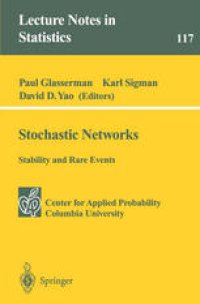
Ebook: Stochastic Networks
- Tags: Statistics general, Probability Theory and Stochastic Processes, Combinatorics
- Series: Lecture Notes in Statistics 117
- Year: 1996
- Publisher: Springer-Verlag New York
- Edition: 1
- Language: English
- pdf
Two of the most exciting topics of current research in stochastic networks are the complementary subjects of stability and rare events - roughly, the former deals with the typical behavior of networks, and the latter with significant atypical behavior. Both are classical topics, of interest since the early days of queueing theory, that have experienced renewed interest mo tivated by new applications to emerging technologies. For example, new stability issues arise in the scheduling of multiple job classes in semiconduc tor manufacturing, the so-called "re-entrant lines;" and a prominent need for studying rare events is associated with the design of telecommunication systems using the new ATM (asynchronous transfer mode) technology so as to guarantee quality of service. The objective of this volume is hence to present a sample - by no means comprehensive - of recent research problems, methodologies, and results in these two exciting and burgeoning areas. The volume is organized in two parts, with the first part focusing on stability, and the second part on rare events. But it is impossible to draw sharp boundaries in a healthy field, and inevitably some articles touch on both issues and several develop links with other areas as well. Part I is concerned with the issue of stability in queueing networks.
Two of the most exciting topics of current research in stochastic networks are the complementary subjects of stability and rare events. Both are classical topics that have experienced renewed interest motivated by new applications to emerging technologies. For example, new stability issues arise in the scheduling of multiple classes in semiconductor manufacturing, the so-called "re-entrant lines," and a prominent need for studying rare events is associated with the design of telecommunication systems using the new ATM (asynchronous transfer mode) technology so as to guarantee quality of service. The objective of this volume is to present a sample of recent research problems, methodologies, and results in these two exciting and burgeoning areas. This volume originated from a workshop held at Columbia University in 1995 organized by Columbia's Center for Applied Probability.
Two of the most exciting topics of current research in stochastic networks are the complementary subjects of stability and rare events. Both are classical topics that have experienced renewed interest motivated by new applications to emerging technologies. For example, new stability issues arise in the scheduling of multiple classes in semiconductor manufacturing, the so-called "re-entrant lines," and a prominent need for studying rare events is associated with the design of telecommunication systems using the new ATM (asynchronous transfer mode) technology so as to guarantee quality of service. The objective of this volume is to present a sample of recent research problems, methodologies, and results in these two exciting and burgeoning areas. This volume originated from a workshop held at Columbia University in 1995 organized by Columbia's Center for Applied Probability.
Content:
Front Matter....Pages iii-xii
Global Stability of Two-Station Queueing Networks....Pages 1-26
Stable Priority Disciplines for Multiclass Networks....Pages 27-39
Closed Queueing Networks in Heavy Traffic: Fluid Limits and Efficiency....Pages 41-64
Asymptotics and Uniform Bounds for Multiclass Queueing Networks....Pages 65-73
Stability of Discrete-Time Jackson Networks with Batch Movements....Pages 75-93
Stability for Queues with Time Varying Rates....Pages 95-107
Nonparametric Estimation of Tail Probabilities for the Single-Server Queue....Pages 109-138
Rational Interpolation for Rare Event Probabilities....Pages 139-168
Overloading Parallel Servers when Arrivals Join the Shortest Queue....Pages 169-196
Rare Events in the Presence of Heavy Tails....Pages 197-214
A Network Multiplexer with Multiple Time Scale and Subexponential Arrivals....Pages 215-235
Networks of Queues with Long-Range Dependent Traffic Streams....Pages 237-256
Fractional Brownian Approximations of Queueing Networks....Pages 257-273
Moderate Deviations for Queues with Long-Range Dependent Input....Pages 275-298
Back Matter....Pages 299-300
Two of the most exciting topics of current research in stochastic networks are the complementary subjects of stability and rare events. Both are classical topics that have experienced renewed interest motivated by new applications to emerging technologies. For example, new stability issues arise in the scheduling of multiple classes in semiconductor manufacturing, the so-called "re-entrant lines," and a prominent need for studying rare events is associated with the design of telecommunication systems using the new ATM (asynchronous transfer mode) technology so as to guarantee quality of service. The objective of this volume is to present a sample of recent research problems, methodologies, and results in these two exciting and burgeoning areas. This volume originated from a workshop held at Columbia University in 1995 organized by Columbia's Center for Applied Probability.
Content:
Front Matter....Pages iii-xii
Global Stability of Two-Station Queueing Networks....Pages 1-26
Stable Priority Disciplines for Multiclass Networks....Pages 27-39
Closed Queueing Networks in Heavy Traffic: Fluid Limits and Efficiency....Pages 41-64
Asymptotics and Uniform Bounds for Multiclass Queueing Networks....Pages 65-73
Stability of Discrete-Time Jackson Networks with Batch Movements....Pages 75-93
Stability for Queues with Time Varying Rates....Pages 95-107
Nonparametric Estimation of Tail Probabilities for the Single-Server Queue....Pages 109-138
Rational Interpolation for Rare Event Probabilities....Pages 139-168
Overloading Parallel Servers when Arrivals Join the Shortest Queue....Pages 169-196
Rare Events in the Presence of Heavy Tails....Pages 197-214
A Network Multiplexer with Multiple Time Scale and Subexponential Arrivals....Pages 215-235
Networks of Queues with Long-Range Dependent Traffic Streams....Pages 237-256
Fractional Brownian Approximations of Queueing Networks....Pages 257-273
Moderate Deviations for Queues with Long-Range Dependent Input....Pages 275-298
Back Matter....Pages 299-300
....